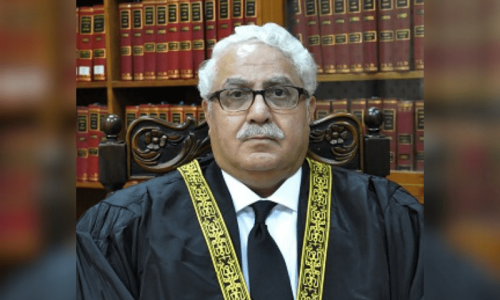ISLAMABAD: The Supreme Court on Wednesday formally announced reconstitution of the three-judge committee with the inclusion of Justice Munib Akhtar after the retirement of Justice Sardar Tariq Masood.
“In continuation of this Court’s Office order dated Jan 12, 2024, the Hon’ble Chief Justice of Pakistan (CJP) has been pleased to reconstitute the requisite committee under Section 2 of the Supreme Court (Practice and Procedure) Act 2023,” says the official order issued on March 11 under the signatures of the Registrar Supreme Court, Jazeela Aslam.
The reconstituted committee will consist of CJP Qazi Faez Isa, senior puisne judge Justice Syed Mansoor Ali Shah, and the next senior judge Justice Munib Akhtar.
Section 2 of the Supreme Court (Practice and Procedure) Act 2023 deals with the constitution of the benches and states that every cause, appeal or matter before the Supreme Court will be heard and disposed of by a bench constituted by the three-judge committee, consisting of the CJP and two next most senior judges, in order of seniority.
Justice Munib included after retirement of Justice Masood
The committee was also required to determine its procedure for holding meetings and constitution of benches, with decisions made by majority.
On Oct 11, 2023, a full court of the Supreme Court, in a split decision, had upheld the practice and procedure act aimed at regulating the affairs of the top court by clipping the powers of CJP. However, it clarified that appeal provided against the decision taken under Article 184(3) of the Constitution will not be applicable with retrospective effect.
Later, in his detailed reasons for upholding the act, CJP Qazi Faez Isa explained that there appears nothing unconstitutional, illegal or objectionable in the act on a plain reading of the provisions, besides the Constitution does not bestow unlimited jurisdiction on the Supreme Court, let alone on its chief justice.
The Constitution, CJP had stated, does not grant the CJP powers to decide cases unilaterally and arbitrarily reminding that the Supreme Court comprise CJP and other judges of the court.
CJP cannot substitute his wisdom with that of the Constitution nor can CJP’s opinion prevail over other judges.
The judgement had also rejected the term used often by describing CJP as “master of the roster”, a term coined by Justice Munib Akhtar, by arguing the term has not been mentioned in the Constitution, in any law or even in the Supreme Court Rules, let alone stating therein that CJP was the master of the roster and empowered to act completely at his discretion.
Earlier, Justice Syed Mansoor Ali Shah became a member of the committee when Justice Ijazul Ahsan, the then senior judge, had resigned on Jan 11.
In addition to member of the committee, the sudden resignation of Justice Ahsan benefitted Justice Shah since he will become the next CJP soon after the retirement of present CJP Qazi Faez Isa on Oct 25, 2024.
Not only Justice Munib Akhtar will sit in the committee to constitute benches, but also in the Supreme Judicial Council (SJC) to consider complaints moved against a number of the superior court judges.
Earlier in Dec 11, 2023, a disagreement had surfaced in the working of the committee, with now-retired Justice Ijazul Ahsan accusing the CJP of not issuing a roster originally agreed upon during the committee meeting.
In two separate letters, one issued to the secretary of the committee on Dec 11 and the other to the CJP on Nov 17, Justice Ahsan had emphasised that the rule of seniority of judges was agreed to be followed to hear cases in the interest of transparency and to maintain the dignity and honour of the Supreme Court.
In his letter, Justice Ahsan had also regretted that the two special benches formed to hear ICA in the military court case and the petition of former judge Sayyed Mazahar Ali Akbar Naqvi challenging the issuance of a show-cause notice by the SJC respectively should be deemed as not set up by the committee.
In response, CJP had expressed his disappointed over the Nov 17, 2023 letter of Justice Ahsan and had stated that his doors were always open to all colleagues.
He mentioned that he was available on intercom and via cell phone. Surprisingly, the judge neither came to talk to him nor reached out by intercom or cell phone to express concerns but levelled allegations that he was not consulted regarding the constitution of the benches, he added.
Published in Dawn, March 14th, 2024












































Dear visitor, the comments section is undergoing an overhaul and will return soon.